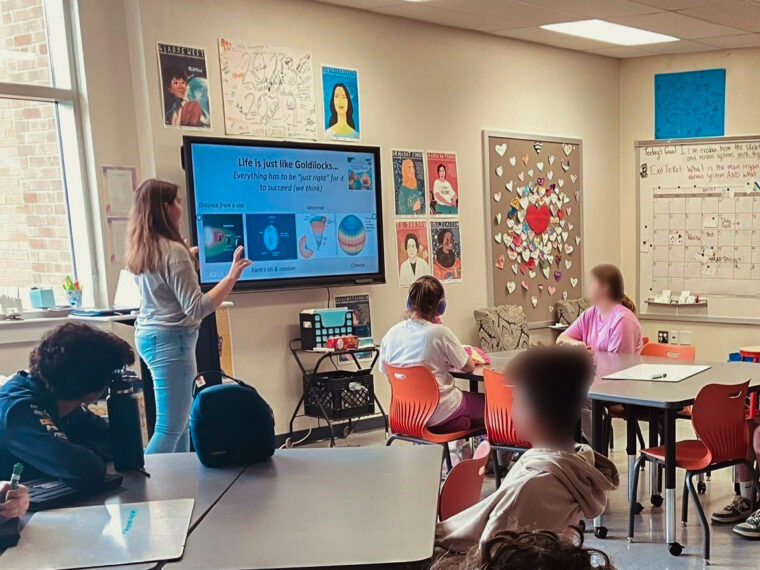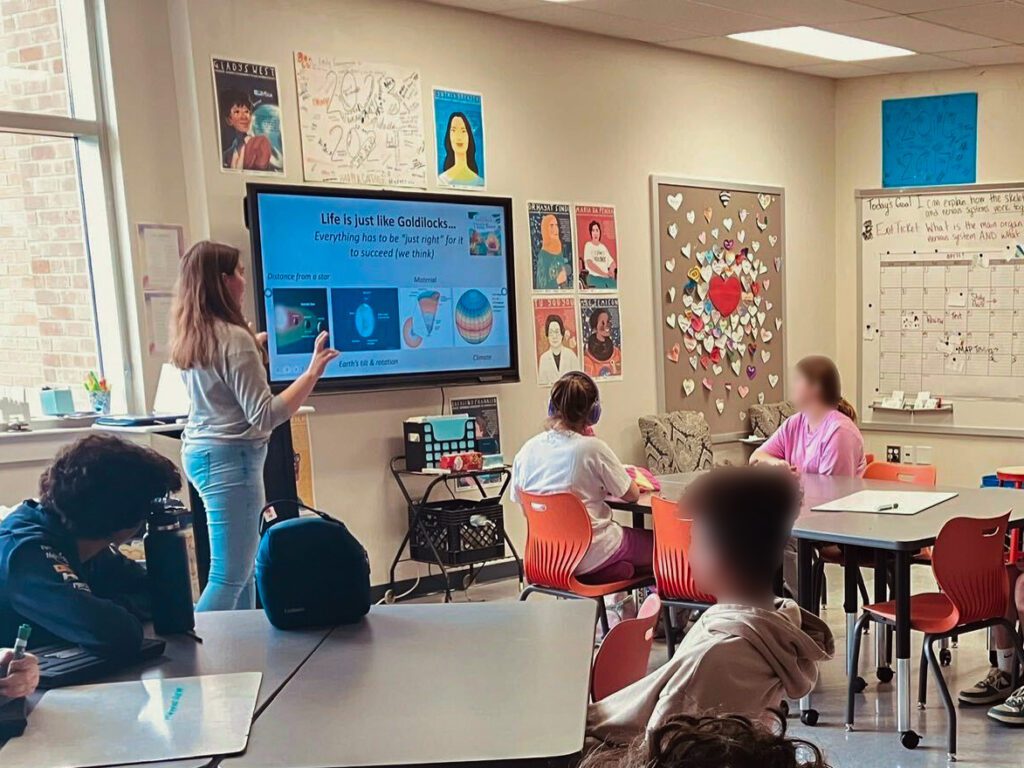
Senior Melissa Parkinson student-teaches a middle school science class. (Courtesy of Melissa Parkinson, faces of students blurred for privacy)
Over the summer, WashU announced that it will be discontinuing its teacher education program for all students matriculating in Fall 2025 and beyond. The Teacher Education program, which is housed in the education department but is separate from the more popular Educational Studies major, has struggled with dwindling enrollment and the high cost of hiring adjunct faculty members to teach specialized courses. Current sophomores, juniors, and seniors, however, will be able to finish their studies before the program is eliminated.
The decision comes as WashU navigates financial challenges, including significant cuts to NIH research funding and a $37 million increase to the University’s endowment tax. Despite a number of cost-cutting measures, the University projects a deficit in the upcoming fiscal year. The Teacher Education program was a casualty of the University’s cost-cutting efforts.
“These financial issues hit, and I think the University was looking at which programs are the most successful and so, in a way, our decision was made for us, and we’re sad about it,” said Andrew Butler, professor of education and former chair of the education department. “At the same time, it does make some sense, right? The programs were just not thriving in the ways that we would like them to.”
Students were first notified that the program was at risk on April 24, when Michele Augustin, Director of Teacher Education and Academic Services, emailed students enrolled in the teacher certification program, notifying them about a “temporary pause” in the program’s admission of students in the class of 2027 and future classes.
Four months later, students received another email from Rowhea Elmesky, Director of Undergraduate Studies and associate professor of Education. Elmesky wrote that the pause had been lifted and students already enrolled at WashU could pursue Teacher Education degrees, but that incoming first-years and future students will not have the same opportunity.
“Due to these ongoing challenges and budgetary constraints, the dean’s office communicated a need to discontinue our teacher education programs for students entering WashU in Fall 2025 and beyond,” the email read. “After much thought and consideration, the department’s Executive Committee voted in favor of supporting the dean’s office.”
As a result, students in the class of 2028 are the last class able to become nationally teacher-certified as an undergraduate at WashU.
The discontinuation of the teacher education program reflects a broader trend across the nation. Other universities like Harvard University and the University of Chicago have also ended teacher training programs in recent years.
“As a larger pattern, both nationally and in the state of Missouri, there have been less people interested in coming into the teaching profession,” Butler said. “When I started as chair in 2019, our numbers had been dwindling.”
Butler said the department had tried a variety of methods to increase enrollment and reduce costs, but ultimately, nothing led to sustainable change.
“We were able to do a lot of things behind the scenes to defer the costs for students, but we could not advertise that,” Butler said. “And so, if you’re going to go be a teacher, why would you look at WashU, even if you thought you could get a great education, why would you pay six times what you would pay at another school to be certified and become a teacher?”
Vice Dean Andrew Brown shared that the College of Arts & Sciences implemented a new policy over the summer requiring all courses that consistently have under five students to receive approval from the dean’s office. He added that many teacher certification courses were under-enrolled, with some having as few as two students, and that the University often had to hire specialized adjunct professors and staff members to support a program with very few students. As the University was looking to cut costs, it concluded that continuing the teacher certification program didn’t make financial sense.
“It really came down to a situation where we have to justify the enrollments that we have in our classes, the fact that there isn’t enough student interest to be able to maintain it, and the kind of high staff requirement on top of that. That was where we ended up at,” Brown said.
Senior and Middle School Education major Clay Kain said that despite the challenges facing the program, the decision came as a surprise to students.
“I was surprised. I understood the politics and the things going on, so I guess I kind of knew it was a possibility, but there didn’t really seem to be a lot of communication ahead of time that [the program] would even be at risk,” he said.
Kain added that the move was especially “disappointing” because many students don’t choose to enter WashU as Education majors but join the program later in their studies. Future WashU students looking to switch to teaching won’t have the same opportunity.
Senior Melissa Parkinson, for example, said she applied to WashU with an interest in its Environmental Science and Political Science programs. She was hesitant about a career path in environmentalism, however, and enrolled in the Teacher Education program. Now she hopes to teach classes like Earth Science and AP Environmental Science after graduating from WashU this spring.
“I saw education as a glimmer of hope,” she said. “At the very least, I can impact the lives of 20 students who walk into my class, and even if they don’t become scientists themselves, I kind of get to meet them at their most impressionable stage in life.”
Without teacher certification, WashU students interested in becoming teachers will need to be certified through graduate school or programs like Teach for America. WashU can still support those on track to become a teacher through alternative graduate programs, like Teach St. Louis, held through the School of Continuing and Professional Studies (CAPS), but WashU will no longer offer teacher certification through a traditional undergraduate or graduate program. Additionally, students can still choose to declare a major or minor in Educational Studies, a program that is more focused on theory.
“[In] Educational Studies, you’re learning more about the discipline of education from a disciplinary perspective, like looking at the history, the politics, the sociology of education, versus teacher certification, where you’re actually getting the pedagogical tools that you need to be able to teach in your content area or in elementary education,” Augustin said.
Augustin reassured students that the department was still there to help students considering Education by informing them of postgraduation pathways. Augustin said she was also focusing on how to increase enrollment for Educational Studies classes.
“I am looking at ways to reduce the number of courses we need to offer each semester by offering certain courses only in the fall or only in the spring, so that we can beef up those numbers of students who need to take those courses,” Augustin said. “Also, we’re looking at how we can use our full-time faculty who have expertise in the different areas that lead to certification to take over teaching [Educational Studies] courses, as opposed to having to hire adjuncts to teach them.”
While upperclassmen currently enrolled in the major will be able to complete their studies, they are still being impacted by the decision. Sophomores and juniors faced a period of uncertainty over the summer during the temporary pause, before finding out they would indeed be able to complete the program as planned. As the University prepares for the elimination of the program in 2029, Kain said that students are already starting to feel the effects.
“There’s definitely impacts within the program that are affecting us now that are a result of all the changes that are happening to it,” he said.
Parkinson also said she wished there had been more transparency. She said that administrators have cited financial factors, but shared little additional information about the reasoning behind the move.
“Maybe because of that lack of transparency, it also feels a little bit like a shift in values, and that fact feels sad, because as an Education major and as someone who cares a lot about the future of education, I wish it were something that were more valued … to [the point] where the degree program would stay.”

